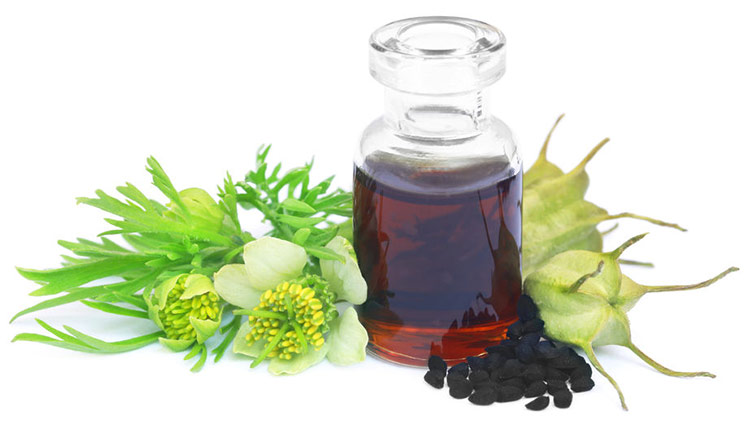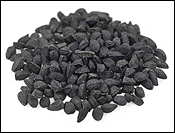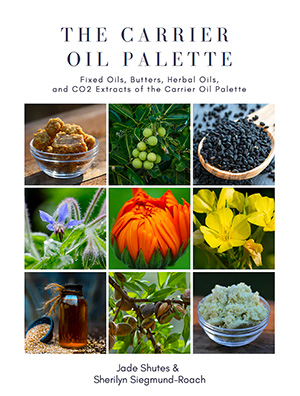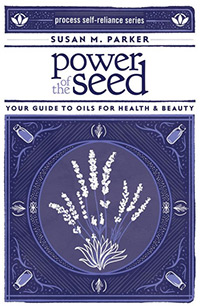Black Cumin Seed Oil
Nigella sativa

Black Cumin Seed Oil is known by a number of other names including Blackseed Oil. This description specifically pertains to the oil derived from the seeds of the plant with botanical name of Nigella sativa.

Aromatically, Black Cumin Seed Oil possesses a mild, earthy, woody and slightly spicy/peppery aroma. It is much-much less intense in aroma than the cumin powder that you may be familiar with for culinary applications. However, do be mindful that its aroma is mild but distinctive.
Black Cumin Seed Oil is anti-inflammatory, anti-bacterial and anti-fungal. Therapeutically in skin care applications, it is said to be especially helpful in promoting the healing of wounds and burns. Since the time I first began actively working with Black Cumin Seed Oil, I have applied it to a deep cut and a minor burn. I was amazed at how quickly the cut healed with no evidence of a scar. The recent burn is still in the process of healing, and I am pleased with its progress.
According to Liquid Sunshine by Jan Kusmirek, Black Cumin Seed Oil contains these essential fatty acids:
- Linolenic Acid (Omega-3): 0.3%
- Linoleic Acid (Omega-6): 56%
Black Cumin Seed Oil is used internally for a number of applications (AromaWeb intentionally does not address the internal use of essential oils or carrier oils) and has a reputation for assisting with auto-immune disorders. This reputation is likely based on its internal use. However, there is indication that Black Cumin Seed Oil may be helpful when used topically by those with eczema, psoriasis and other auto-immune skin disorders.
Some studies also seem to indicate that Black Cumin Seed Oil may play a role in helping to prevent or treat certain forms of skin cancer. I would strongly recommend against using it in place of sunscreen products or in place of skin cancer treatment procedures outlined by your qualified medical practitioner, but Black Cumin Seed Oil could potentially play a complementary role.
I tend to use Black Cumin Seed Oil on its own or for therapeutic applications, and haven't dabbled much with blending it with essential oils for fragrancing, spiritual or emotional work. With its unique aroma, I am intrigued to explore this oil even further beyond its use in skin care.
Botanical Name
Nigella sativa
Aroma
Mild, Earthy, Peppery/Spicy, Woody
Viscosity
Medium
Absorption/Feel
Quick Absorption. Leaves a Slight, Oily Sheen.
Color
Golden Brown
Shelf Life
2 Years
Important Information
The information provided on AromaWeb is for educational purposes only. This data is not considered complete and is not guaranteed to be accurate.
General Safety Information
Use caution when trying any new ingredient, including carrier oils on the skin or in the hair. Those with nut allergies should consult their medical practitioner before coming into contact with nut oils, butters or other nut products. Do not take any oils internally without consultation from a qualified aromatherapy practitioner. Safety information can be found by visiting the Safety Information page. For very in-depth information on oil safety issues, read Essential Oil Safety by Robert Tisserand.
Carrier Oil Book Suggestions
Click on a book's title to view details and read a full review for the book. Visit AromaWeb's Books area to find details about many other essential oil and aromatherapy books.

The Carrier Oil Palette: Fixed Oils, Butters, Herbal Oils, and CO2 Extracts of the Carrier Oil Palette
Authors: Jade Shutes & Sherilyn Siegmund-Roach

Power of the Seed: Your Guide to Oils for Health & Beauty
Author: Susan M. Parker

Carrier Oils for Aromatherapy & Massage
Authors: Len Price with Ian Smith & Shirley Price
